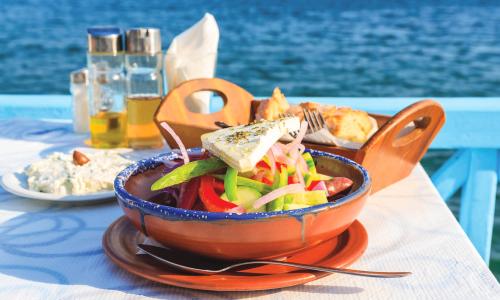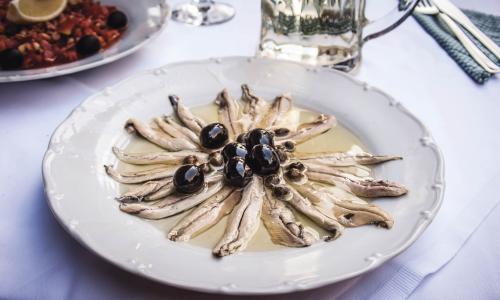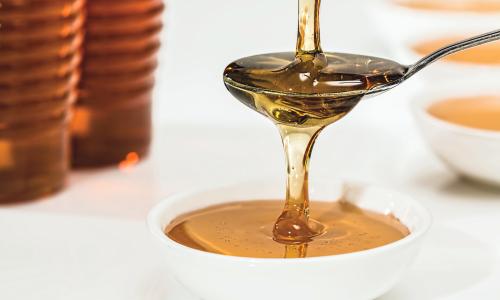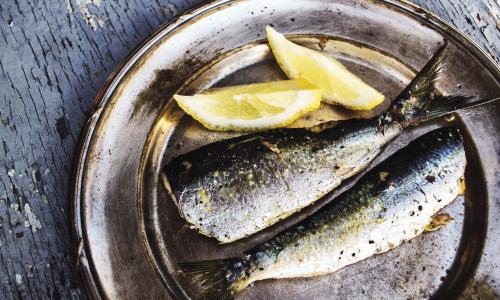Savour the culinary delights of Greece! Savour every mouthful!
Greek gastronomy has already won a place at the top of contemporary world gastronomies.
Greek diet is famous worldwide; it isn’t only tasty but also very healthy, recommended by most expert top dietitians.
Greek cuisine, rich in authentic flavours and aromas, represents an age-old cultural unity. It has a history of around 4,000 years, with special characteristics based on pure and unique quality goods of the Greek land. In fact, it was Archestratus (in Greek Archestratos), an ancient Greek poet and philosopher, who wrote the first cookbook in history (around 350 BC).
Greek cuisine consists of a great variety of dishes that can fully meet the gastronomic requirements of vegetarians and meat & fish lovers alike.
Nowadays Greek cuisine, combining tradition with modern concepts, follows four basic rules: good quality and fresh ingredients, correct use of natural flavourings (herbs) and spices, use of the famous Greek olive oil, and simplicity.
Tasting Greece offers a rare experience with distinguishing recipes, representative products, and original preparation techniques.
Travellers to Greece come eager to taste good and healthy food prepared with the best-quality virgin olive oil, try the delicious olives abundantly found in the Greek landscape, savour the particular cheeses of the Greek countryside, and enjoy the wholesome meat and poultry as well as the freshest fish and seafood. Vegetables and fruits are a chapter on their own. They come in a great variety of fresh full flavoured and fragrant produce that make up a significant part of the Greek diet. Visitors will also indulge in the particular taste and aroma of the traditional Greek spirits “ouzo” and “tsipouro” or “raki”, as well as of the famous Greek white, rosé and red wines produced according to revered old recipes.
Flavourings: Herbs, which almost every Greek gathers from the countryside and the hills, are renowned for their tang, aroma and curative properties. As you taste some of the many different Greek dishes, you will be mesmerized by the wonderful aroma of oregano, thyme, mint, rosemary and crocus.
Honey: According to ancient Greek myths, honey was one of the basic foods of the Olympian gods and Zeus was honey-fed by the nymph Melissa (Honey Bee). Whichever region it is collected from, it reminds you of Greece. Especially nourishing, invigorating, antiseptic and necessary for good health, honey really does wonders. In recent years it is also used in many Greek recipes creating new “exploding” tastes. The best Greek honey is reckoned to be the pure-thyme variety from the more barren areas of the mainland and the islands.
Olive oil and olives: Olive oil is the true gold of the Greek earth. Its colour varies from light golden green to deep cypress green. Each region is famous for its own oil with very distinct characteristics and its own unique flavour. Olive oil has been recognized worldwide as one of the most beneficial products for the overall well-being of the human organism.
Greek olive oil is of excellent quality and accompanies almost all Greek dishes.
The international scientific community considers it a basic health factor.
The therapeutic properties of olive oil, but also of the leaves and fruits of the olive tree, have been praised by many, and Hippocrates, the famous doctor of ancient Greece and “father” of modern medicine, was the first among them.
New and innovative cultivations produce rich varieties of quality olive oil and delicious olives. All over Greece, olives bitter or sweet, green, black or brown, small or big, in olive oil, salt water or vinegar, are widely consumed and are some of the tastier of the world.
Greek wines Wine, the nectar of the ancient Olympian gods, has a primary place on the Greek table supplementing and promoting the richness of the Greek cuisine since antiquity. Greek wine isn’t just a product, it is a cultural artefact. The Dionysian character of Greek culture developed around the consumption of wine. The meal is a sacred ritual, a celebration. The symposium, the ancient Greek custom of imbibing wine in the company of friends, gave rise to philosophical works such as “Plato’s Symposium” (by Plato, 428-348 BC), the “Symposium of the Seven Wise Men” (by Plutarch, 45-127 AD) and the early 3rd-century AD Greek work “Deipnosophistae” (“Dinner Sophists”).
Nowadays Greek wines are deservedly considered among the best in the world for their unsurpassed taste and their wide selection. Greek producers embrace the indigenous varieties and do not hesitate to fuse them with international ones, creating a whole new and exhilarating experience.
Vegetables, pulses and fruits: Due to the mild Greek climate, most vegetables, pulses and fruits are cultivated in natural ways and they therefore maintain their flavour and their aroma. Being a basic part of the Greek diet, they promote health, occupy a highly regarded place on the table and they are simply delicious. You will be happy and content after tasting a Greek tomato, cabbage, carrot, parsley and onion. At the same time, you should not forget the rich flavour and aroma of fresh Greek fruits such as peaches, pears, apples, apricots, cherries, oranges, tangerines, grapes, melons, watermelons, etc.
Cheeses: Greek stock farmers and cheese makers collect ewe’s, goat’s and cow’s milk and convert it into excellent cheese applying their own traditional techniques. Greek cheese, unique in its kind, can be a key ingredient or provide a tasty touch in a delicious dish, or can be a course on its own. Raw, fried, roasted or melted, Greek cheese is a succulent authentic experience. Certified as an exclusively Greek product worldwide is “feta” cheese. It is the main ingredient of most Greek pies that are a distinct part of Greek gastronomy and tradition, as well as of the so-called Greek salad (“horiatiki salata”) served in all Greek restaurants and tavernas. Hard or soft, salty or piquant, “feta” has a distinct place not only on the everyday Greek table but also in the menus of the best gourmet restaurants in the world.
Cheesemaking, though, does not end with “feta” production. Other particular cheeses of the Greek countryside are: piquant Cretan, Naxos or Tinos graviera (Gruyere); kasseri from Lesvos or Xanthi; kefalotyri or kefalograviera; fresh anthotyro or manouri; tangy “kopanisti” from the Cyclades; “kalathaki” (white, soft cheese) from Lemnos; “metsovone” (semi-hard smoked cheese) from Metsovo (Epirus); and traditional myzithra (unsalted soft or salted hard).
Fish and seafood: Mediterranean seafood is much tastier than those from the ocean. The Aegean and Ionian Seas are crystal clear and rich in fish. Just-off-the-sea and the taste of the salty sea still lingering, Greek fish (“psaria”) and seafood (“thalassina”) constitute a basic part of the Greek diet. And it couldn’t be any different in a country surrounded by sea and islands. Fresh fish prepared in the traditional way, cooked on a fire, grill or wood-burning oven, is considered to be a true delight, while “psarosoupa” (fish broth) and “kakavia” (a bouillabaisse-like stew) are made in many different ways since every region makes its own original recipes.
Grilled, fried, cooked or raw, Greek seafood (octopus, squids, shrimps, lobster, crabs, mussels, oysters, clams, etc.) are exquisite. Greek chefs feel proud of themselves for their creations combining them with lemon, vinegar, white wine, parsley and garlic, or cooking them with ouzo or tsipouro. It’s also well worth sampling lobster (“astakos”) in some islands: it’s a local delicacy, a real culinary delight, often served flaked into pasta (macaroni) as “astakomakaronada”.
Meat: The fact that in Greece the sheep and goats are free-ranging and the pastures are especially green and lush, Greek meat is of exceptional quality, has a unique taste and offers refined and healthy choices.
Among Greek meats, “souvlaki” (kebab) and “gyros” (doner kebab), both usually served with “pitta” bread, have won over everyone who has tasted them. The first places on the Greek menu also hold: grilled (cooked over a fire) veal / lamb/ pork chop (“brizola”) and small lamb rib chops (“paidakia”); grilled large meatball (“bifteki”) and fried meatballs (“keftedes”); spit-roasted lamb (“psito arni souvlas”); stewed goat (“gida vrasti”) and baked kid {“katsiki sto fourno”) or succulent kid in the pot (“katsiki sti gastra”); veal steak or rabbit stew in red sauce; suckling pig on the spit (“gournopoulo souvlas”); chicken (“kotopoulo”), especially grilled. Other meat specialities worth trying are “kokoretsi”, made of lamb offal and cooked for many hours on the spit, “kontosouvli” and “exohiko”, both also have to be spit-roasted for many hours, but it is worth the wait.
…discover greek gastronomy at your hotel’s breakfast
Within the frame of its basic objectives the Hellenic Chamber of Hotels designed, realized, supported and most of all believed in the Greek Breakfast.
The aim of the Hellenic Chamber of Hotels is to make the Greek Breakfast a source of added value to the Greek Hospitality professionals:
- By giving them the chance to diversify the provided services
- By contributing to the upgrade of the travel experience of the tourists
- By contributing to the development of the primary sector
Performing its institutional role with a high sense of responsibility, the Hellenic Chamber of Hotels attempts, with Greek Breakfast, to organically connect tourism with the agro food sector, the two productive branches that will form the pillars of the new development model of the country.
The Greek Breakfast is an initiative taken by the Hellenic Chamber of Hotels which utilizes and connects the cultural- gastronomic wealth of the country with the Greek hotel business.
It is a program designed by the Hellenic Chamber of Hotels which has been in operation since 2010 and whose aim is to enrich the breakfast offered in Greek hotels with pure and unique Greek products as well as with traditional local dishes from every region of Greece.
The aim of the “Greek Breakfast” program is to give Greek hotel guests the chance to know the gastronomic wealth of our country and taste at breakfast the innumerable Greek products and dishes which are at the heart of the Mediterranean Diet. The Mediterranean Diet is not just a modern dietary trend but is according to UNESCO the “intangible cultural heritage of mankind”.
It is the gastronomic diversity of each region that the “Greek Breakfast” wants to highlight, contributing to the formation of the cultural identity and tourist profile of each place, giving in this way guests the chance to get to know and taste at breakfast the wealth of our Greek gastronomic tradition.






